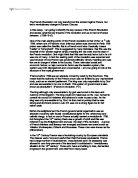Waqar Jamshed
How far do you agree with the view that the nineteenth century proved to be a century in which nationalism played a dual role, on one hand transforming the European state system, while on the other hand ensuring that democracy and socialism did not challenge the power of established elites?
The Vienna settlement was concluded on June 8th, 1815; ten days before Napoleon's inevitable surrender became reality. The main goal of the settlement was widely recognised as to achieve such a balance of power, that no one state should be in the position to threaten the independence of another. Through this balance of power the European statesmen hoped to provide for stability in Europe and thus secure peace. Securing peace was also ensured by the efforts made to prevent further French aggression. Not all the principles, however, where this vague and idealistic. Especially the monarchs wished to secure their own position and work together to prevent revolutionary ideas from spreading. Thus came the principles of solidarity and legitimacy: all the 'legitimate' rulers should be bound to solidarity. The key aims of Vienna settlement were to restore the old system absolutism, restore the divided and weak state system in central Europe, prevent revolution across Europe, resolve disputes between states in Europe and prevent political change across Europe.
The concert of Europe also known as ‘congress system’ was much of the Vienna settlement and was a compromise between the rivals aims and ambitions of great powers. They wanted a settlement which would provide stability in Europe and prevent the outbreak of another general war. The concerts of Europe’s first primary objectives were to contain France, after decades of war achieve a balance of power between Europe's great powers, uphold the territorial arrangements made at the Congress of Vienna in 1814-1815 and in doing so
Prevent the rise of another Napoleon-esque figure which would result in another continent wide war.
The powers of Europe also wanted to keep old order which is ancient regime. It was established in France from15th century to the 18th century under the late Valois and Bourbon dynasties. Power in the Ancien Régime relied on three pillars: the monarchy, the clergy, and the aristocracy. They wanted absolutist monarchs in Europe except North West Europe where parliament had some powers, no vote or very limited franchise, aristocracies dominated political system. Vest majority of the people in society were excluded from political system. The peasant formed the largest section of the population but they were tied to locality because of feudal arrangements serfdom. That’s where the people start thinking of nationalism and liberalism as the wanted reform. There were the political ideas which led to revolutions in Europe. Nationalist demanded that people which shared a common culture based on language, race or religion should have their own unification or independent nationalist wars and revolution occurred in Greece (1821-29), western and central Europe (1848-49), Italy (1859-61), Germany (1866-70), and the Balkans (1871-1881). Liberals throughout Europe demanded that absolutism be abolished and elected parliaments only by property owners make laws instead of monarchs. Liberal revolutions occurred throughout Europe 1820-21, 1830-33, 1848-49. Conservatism was a political idea which defence of the old established order, church, landowning elites, tradition, customs, authority. Conservatives ideas were popular among the elites, old landed aristocracy, peasants and church. Democracy in which radical liberals demanded that every male citizen of a state whether he had property or not, should have the vote. They looked back to Jacobin France and classical Athens as examples to be copied. They participate in the 1848-49 revolutions.







